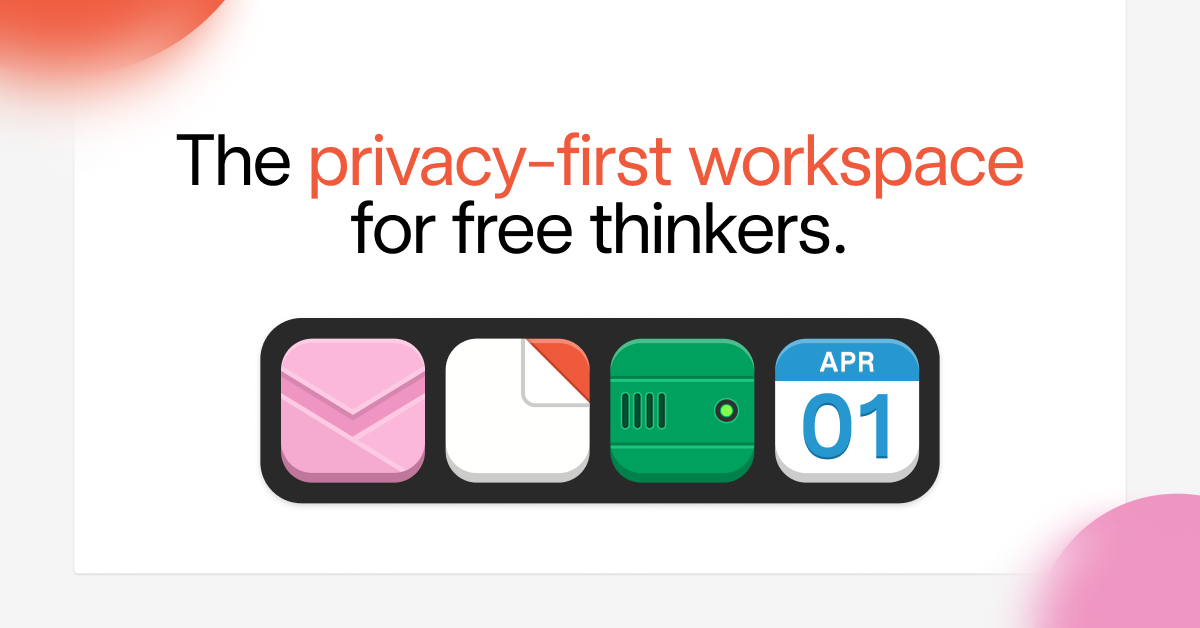why did notion buy it? to shut it down?
They’ve just done the same with a calendar app that I forget the name of. They then rereleased it under their own brand.
They appear to be on an unspoken mission to challenge Google’s suite of apps, so I’d hazard a guess that email tech is a part of that puzzle (along with calendar)
Cron. They didn’t shut it down though, they just suddenly transitioned it. I’d just started using Cron when they did it and it was very unexpected for me.
I mean that sounds pretty reasonable, could they just not think of a name that wasn’t already in prevalent use? Was the goal to be unsearchable for anyone trying to find it?
That’s like creating a reminders app and naming it task manager.
They renamed it Notion calendar, but Cron had pretty solid SEO. I much preferred its old name and theme.
Well that’s great for them, but that also means that people searching for the cron that has had that name for 50 years are going to get irrelevant results for a calendar app.
I seriously doubt people looking for cron are going to be confused by a calendar app.
Help guys, every time I go to look up the mail command, the fucking USPS shows up.
Or a spreadsheet program and calling it Excel.
Or outlook, access…
The name doesn’t matter if you can establish it.
Their point isn’t that it’s a weird name that isn’t descriptive of what the product does, their point is that cron is an already existing bit of software that does something else.
It’d be like if MS made a notes app called Steam, Google called a new camera app iTunes, or Apple rebranded Apple Music to PowerShell.
Minus the trademark infringement I guess. I doubt Cron has that.
That’s the one, and you’re right, it is currently a rebrand but ultimately the same product.
I think having separate apps is the wrong way to go for their “integrate everything in one place” philosophy, over the longer term. I’m eager to see what they do with it next.
There mission must be copying Google killing perfectly good products.
Yes! Also because capitalism is the bestest, most innovative economic system ever!
Perhaps interested in the people working there and wanting to create their own email service from the ground up?
Their generous offering of 10gigabytes of free storage along with a private, ad-free, end-to-end encrypted experience always sounded too good to be true. There was no way they could sustain that business model long term. At least they’re giving users enough time to jump ship and have not sold their data to Notion (judging by their twitter replies).
There is a not-insignificant amount of start ups and small projects out there looking to hook the privacy-minded crowd seeking smaller, independent replacements for Microsoft /Google/Apple’s various services and suites.
And that’s good in the sense there’s more options, but some of them (not all, but some) don’t seem to be from people that truly believe in their product and intend to maintain it long term, they just want to get enough users to get acquired.
Stage 1 is done. Stage 2 is beginning:
now here’s how a platform dies. first it’s good to its users. then it abuses those users to make things better for business customers.
Here is an alternative Piped link(s):
https://piped.video/rimtaSgGz_4?t=128
Piped is a privacy-respecting open-source alternative frontend to YouTube.
I’m open-source; check me out at GitHub.
>free thinkers
Lol. Lmao even.
deleted by creator
Imagine a future where every home user can run a FreedomBox or something similar with decentralized services like email with your own custom email domain, XMPP and more. No more exploitation by commercial companies.
🌞
It’s a nice thought but if everyone were to manage their own email server (and other things) we would have SO much more security problems in general.
I spend a not insignificant amount of my work week now dealing with quarantined or bounced mail from other companies that can’t or won’t set up DKIM, SPF, and DMAC properly. Not individuals, companies, with IT departments.
You’ll never get most people to properly manage their own email server.
Prolly cause their I.T. is Ian Trevor, a guy who knows how to boot up the mail server box.
This is true.
And it’s a problem with email itself lacking a native security infrastructure.
I don’t know what the answer is - maybe less reliance on email? But then it would have to be supplanted by something else.
Seems like we’re still in the developing phase of all this stuff.
Email grew during a time when connectivity was sporadic. I’ll check my email when I get connected. So store-and-forward.
We still need the store-and-forward capability, but we now rely on instant delivery.
Then there’s the conversation vs letter idea, files/attachments, etc.
Corporate systems try to combine it all, which makes sense. No reason to move files about, instead have a repository and send coworkers links to the files since we’re all part of the same infrastructure (it’s a database after all).
If we look more abstractly at the major functions people use, there’s largely messages (ad-hoc, one-off), conversations (something like messages, with group management, longer-term chains, etc), data sharing (files, images, video, preferably links so people retrieve as needed), meta-data (say contact info, business info, location data, etc), and who’s know what else I’m missing. Designing system/s to manage all this while being extensible seems the big challenge.
To go full circle on this, even if everyone self-hosted this same repository/messaging platform, we’d need some kind of federation capability, with security and trust management.
It would be interesting to see any research on this from Microsoft (and other groups, universities, FB etc) - their R&D org really knows their stuff. I’d like to see the high-level, abstract, major categories of elements.
That used to be a thing until everyone started drooling over cloud based services, which I never trusted but time marches on and services for the masses are much needed.
I never really trusted them. Now I know why.
This sort of thing is why I went with an established, for-pay email provider (fastmail). I mean, they might still sell out if someone made them an attractive enough offer, but they’re not looking for offers the way a recent startup would be, and it’s obvious where they get the cashflow to sustain the business from.
The enshit intensifies
Used it for a little bit. Seemed really nice, but it was quite janky so I backed out and went back to Mailbox. Feel like I dodged a bullet.
The entire service didn’t feel very reliable from the start. And look what happened.









